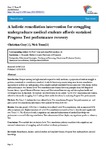A holistic remediation intervention for struggling undergraduate medical students affords sustained Progress Test performance recovery
| dc.contributor.author | Gray, Christian | |
| dc.contributor.author | Toms, Nick | |
| dc.date.accessioned | 2018-09-28T08:39:10Z | |
| dc.date.issued | 2018-09-12 | |
| dc.identifier.issn | 2312-7996 | |
| dc.identifier.issn | 2312-7996 | |
| dc.identifier.uri | http://hdl.handle.net/10026.1/12428 | |
| dc.description.abstract |
<ns4:p>This article was migrated. The article was not marked as recommended. Introduction: Despite meeting the high standards required to study medicine, a proportion of students struggle to perform consistently to a satisfactory standard. Available literature promotes using more holistic remediation approaches to address any underpinning, often complex multiple interlinked factors associated with chronic student underperformance. Our holistic Level Two remediation intervention draws on principles from Self-Regulated Learner theory, Spaced-Retrieval Practice theory and Motivational Interviewing, and also explores health and wellbeing factors. In this study, we explored the effectiveness of our holistic "Level Two" remediation intervention, offered to chronically struggling Yr1-5 undergraduate medical students, by analysing Progress Test performances. Methods: For Year 1-5 students that were offered Level Two remediation, Progress Test performances pre- and post a Level Two remediation intervention were analysed between 2008-2017. Results: Over this period, 5.9% Year 1-5 students were offered Level Two remediation, with an associated 93% offer acceptance rate. Highest incidence of Level Two remediation occurred in Year 2, then declined significantly over Years 3-5. For all years of study, a significant and sustained enhancement of medical knowledge test performance occurred following remediation. This enhancement did not display any significant gender or ethinicity bias. Conclusions: We conclude that our holistic Level Two remediation pathway correlates with a significant and sustained enhancement of struggling medical students' academic performance.</ns4:p> | |
| dc.format.extent | 210-210 | |
| dc.language | en | |
| dc.language.iso | en | |
| dc.publisher | Association for Medical Education in Europe | |
| dc.rights | Attribution 4.0 International | |
| dc.rights | Attribution 4.0 International | |
| dc.rights | Attribution 4.0 International | |
| dc.rights | Attribution 4.0 International | |
| dc.rights | Attribution 4.0 International | |
| dc.rights | Attribution 4.0 International | |
| dc.rights.uri | http://creativecommons.org/licenses/by/4.0/ | |
| dc.rights.uri | http://creativecommons.org/licenses/by/4.0/ | |
| dc.rights.uri | http://creativecommons.org/licenses/by/4.0/ | |
| dc.rights.uri | http://creativecommons.org/licenses/by/4.0/ | |
| dc.rights.uri | http://creativecommons.org/licenses/by/4.0/ | |
| dc.rights.uri | http://creativecommons.org/licenses/by/4.0/ | |
| dc.title | A holistic remediation intervention for struggling undergraduate medical students affords sustained Progress Test performance recovery | |
| dc.type | journal-article | |
| plymouth.volume | 7 | |
| plymouth.publication-status | Published online | |
| plymouth.journal | MedEdPublish | |
| dc.identifier.doi | 10.15694/mep.2018.0000210.1 | |
| plymouth.organisational-group | /Plymouth | |
| plymouth.organisational-group | /Plymouth/Faculty of Health | |
| plymouth.organisational-group | /Plymouth/Faculty of Health/Peninsula Medical School | |
| plymouth.organisational-group | /Plymouth/Users by role | |
| plymouth.organisational-group | /Plymouth/Users by role/Academics | |
| dcterms.dateAccepted | 2018-09-12 | |
| dc.rights.embargodate | 2018-10-3 | |
| dc.identifier.eissn | 2312-7996 | |
| dc.rights.embargoperiod | Not known | |
| rioxxterms.versionofrecord | 10.15694/mep.2018.0000210.1 | |
| rioxxterms.licenseref.uri | http://creativecommons.org/licenses/by/4.0/ | |
| rioxxterms.type | Journal Article/Review |



